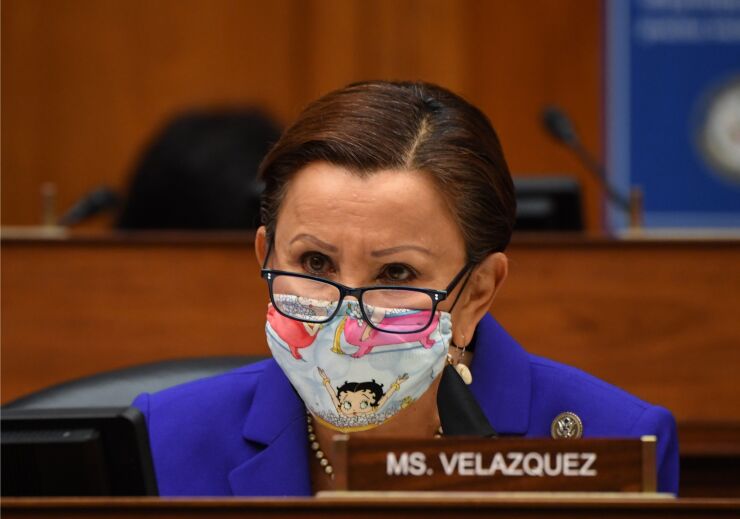A bill proposed in the U.S. House would go further than
The legislation introducted by Rep. Nydia M. Velázquez, D-N.Y., this week would expand certain disclosure requirements under the Truth in Lending Act and federal regulatory oversight to small-business loans.
Velázquez, who chairs the House Small Business Committee, is taking particular aim at online lenders that charge annual interest rates as high as 350%, often without disclosing those costs to the borrower. She noted that more and more small-business owners are expected to turn to alternate sources of financing to stay afloat during the coronavirus pandemic.
“With the COVID-19 pandemic, our entrepreneurs are facing some of the most difficult economic conditions ever and it is vital we ensure unscrupulous lenders don’t exploit this situation by enticing small businesses into unfair and unsustainable loans,” Velázquez said in a press release.

However, unlike similar bills passed by lawmakers in
The Small Business Lending Disclosure and Broker Regulation Act would apply some of the same protections provided by TILA to small-business loans. Lenders would be required to disclose the annual percentage rate, loan terms, payment amounts and collateral requirements, according to the
The bill would also authorize the Consumer Financial Protection Bureau to police small-business lending the way the agency oversees consumer loans such as mortgages. A new office would be created at the agency to monitor small-business loan “brokers,” who market financing offers to business owners seeking credit. The bill would require these loan matchmakers to register with the bureau.
Velázquez said brokering small-business loans “has become a thriving cottage industry in recent years” and said it was important to ensure small businesses hear “the full range of options and their best interests are not being sacrificed to deliver the broker with larger fees.”
About a third of small-business owners turned to online lenders for financing in 2018, up from 19% in 2016, according to a December
However, even though the bill targets nonbanks, it would technically apply to banks as well. This departs from the California bill that became law last year and the New York legislation awaiting Gov. Andrew Cuomo's signature, both of which include carve-outs for depository institutions.
Some lenders have welcomed the effort to toughen disclosure requirements.
New York "recently approved similar legislation that gives small businesses more control and transparency to compare and shop commercial loans and we're in favor of efforts that do the same,” said Sam Taussig, head of policy at the online lender Kabbage.
Bill Phelan, senior vice president and general manager at Paynet, a provider of small-business ratings and data analytics, said it should not be surprising that mainstream lenders are backing the House bill.
"Credible lenders want transparency, they want fair lending," Phelan said Friday. "The general idea is that transparent, open lending makes for a healthy, more vibrant marketplace for small- business credit."
The Responsible Business Lending Coalition, which represents a cross section of nonprofit and for-profit lenders, estimates that Velázquez’s proposal would save nearly 800,000 small businesses about $3.8 billion each year in excessive debt costs.
"The Truth in Lending Act does not apply to commercial financing at all, so there are no federal commercial financing disclosure requirements for banks or nonbanks," said Kim Wilson, policy director for the Feighan Team, a Washington firm that provides staffing for the Responsible Business Lending Coalition.
The progressive Small Business Majority, which is based in San Francisco, stressed that small-business owners struggling during the pandemic need stronger protections particularly if they did not receive financial help through the Paycheck Protection Program.
“Falling victim to one of these predatory products in the midst of this crisis could sink millions of vulnerable small businesses,” the group’s founder and CEO, John Arensmeyer, said in a press release.





